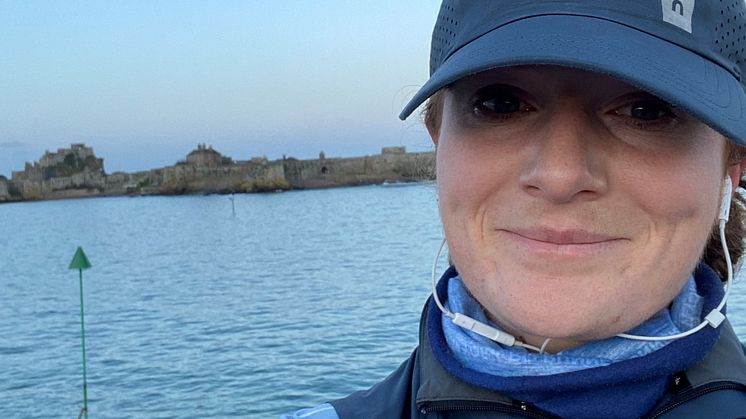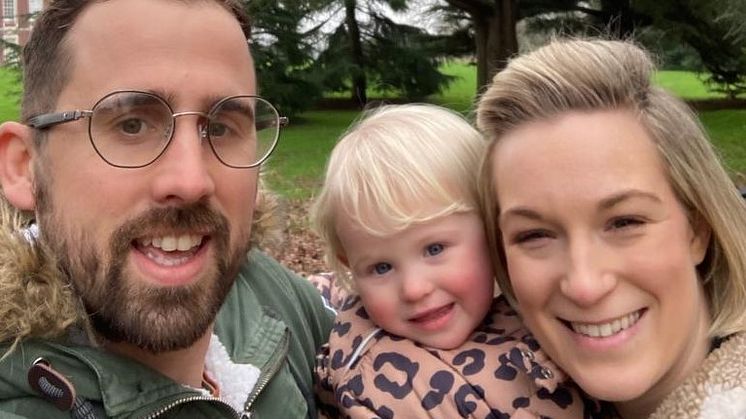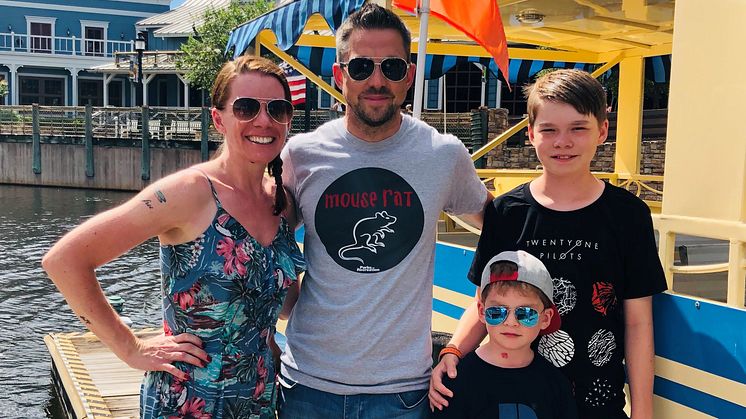Press release -
More than half of Brits unaware that stroke is one of the biggest killers in the UK, according to Stroke Association study
More than half of Brits unaware that stroke is one of the biggest killers in the UK, according to Stroke Association study
More than half of Brits don’t know that stroke is the fourth biggest killer in the UK, according to new research by the Stroke Association1. The charity has released the survey findings as it calls for vital support to fund more research into the devastating condition.
A stroke happens when the blood supply to part of the brain is cut off, killing brain cells. The charity’s latest study asked the general public to rank health conditions in order of the leading causes of death. 51% of people who ranked stroke placed it below its actual position as the fourth biggest killer2.
The research also revealed that almost a fifth of people (18%) underestimate the impact of stroke, believing that stroke ranks lower than its actual position as the fifth leading cause of disability (and death combined) in the UK3. In fact, two thirds of people who survive a stroke find themselves living with a disability.
There are 1.3 million stroke survivors living in the UK, with over 50% of all stroke survivors dependent on others for everyday activities. However, the Stroke Association’s survey also found that people don’t understand the true long term damage a stroke can cause:
- More than two-thirds (67%) of people are unaware that fatigue is a common hidden effect of stroke
- More than two thirds (67%) don’t realise that stroke can cause depression and anxiety
- Around a third of people (32%) don’t know that communication difficulties are common after stroke
- Almost three quarters of people (74%) don’t know that stroke can affect hearing
- Two thirds (66%) are unaware that stroke survivors can experience vision problems.
Despite the devastating impact of stroke, stroke research is chronically underfunded and receives far less funding than other health conditions that have similar life-long effects. In the UK far less is spent per survivor on research into stroke than research into any other health condition.
Data shows that annually, only 1.2% of research budgets (approx. £30m) are spent on stroke, compared with 14.8% (approx. £400m) on cancer4, while there are 1.3m people living with the effects of stroke in the UK and 2.5m living with cancer. However, the survey reveals many Brits believe more research funding is spent on stroke than other conditions including prostate cancer, dementia and chronic lower respiratory diseases.
The study also found that almost half of people (46%) think that the number of deaths from stroke has increased in the last 10 years. However, despite stroke being the UK’s fourth biggest killer, the rate of deaths has actually decreased by more than half in the last three decades thanks in part to life saving research5, demonstrating the crucial need for continued investment in stroke research.
Sam Webb, DPhil student at the University of Oxford, said: “Problems with memory and thinking are very common after a stroke and have a huge impact on a stroke survivor’s ability to do everyday tasks such as going to the supermarket or using money. It’s vital that these problems are detected early on. However, current methods to assess thinking problems after a stroke do not replicate a stroke survivor’s real-life experience. With the support of the Stroke Association, I’m working on a promising new test – OxMET – that replicates a real-life shopping experience on a computer tablet and will accurately assess a stroke survivor’s ability to do complex thinking tasks. The test is easy to use for stroke survivors with movement and communication problems and is simple to roll out in hospitals. OxMET is a cornerstone of advancing stroke research and care and will enable us to understand the thinking problems stroke survivors struggle with daily, so we can develop new tailored treatments that allow stroke survivors to live their best possible lives after a stroke”
Glen Eastick, a personal trainer from Havant had a stroke while leading an online class is backing the Stroke Association’s call for more research into stroke. He also wants people to realise that stroke can affect people who are young and fit – he was just 33 when he had his stroke in July 2020.
Glen’s symptoms started while he was preparing his lunch. “I briefly lost the use of my arm for about ten seconds and dribbled a bit but then continued making lunch.” “Then when I went into my next online session I realised I couldn’t talk. Nothing was coming out except the odd word. My client was saying are you ok? “My girlfriend Bex was out on a walk with our six-week-old baby Evie and as soon as she came back she realised something was wrong as I was struggling to talk. She called the ambulance and I was rushed into hospital.”
Ironically, the stroke specialty doctor waiting to treat Glen at the Queen Alexandra Hospital in Portsmouth, was James Beckett who is also one of his personal fitness clients.
A scan confirmed that Glen had had a stroke and he was thrombolysed – given special drugs to dissolve the clot which was blocking the blood supply and killing cells in his brain. Thanks to the prompt action by Bex who spotted the “FAST” stroke symptoms, the skills of hospital staff and his own determination, Glen has made a good recovery. Glen’s stroke was caused by a PFO ‘hole in the heart’ which allowed clots to travel between the chambers of his heart and up to his brain. In July 2021 he had an operation to close this hole at the John Radcliffe Hospital in Oxford.
“I’ve been very fortunate to make a good recovery but other aren’t so fortunate which is why research is so important,” said Glen. I think research into PFOs or why blood tends to clot more in some people than others may help. I also believe that research into medication could be done more as I am on the drug clopidogrel at the moment. I am taking it, but the idea of being on medication for the rest of my life doesn’t fill me with joy. As a personal trainer I specialise with people in health conditions such as MS and stroke so I know all about them but never thought it would happen to me. After my stroke I took all of my theory and made it relevant for myself. I knew what I should and shouldn’t do to get me back into running again. It can be quite unnerving to go back into exercise after a stroke and you worry it might happen again. You worry that you can’t trust your body any more. I am proud that I beat my 10k personal best 3 months after heart surgery.”
Juliet Bouverie OBE, Chief Executive of the Stroke Association, said: “Stroke strikes every five minutes in the UK and while it changes lives in an instant, the brain can adapt and rebuild after stroke. That’s why research means everything to our nation’s 1.3 million stroke survivors and their families, because of the life-changing impact it could have on their future. Our pioneering research has been at the centre of major breakthroughs that have saved lives and sparked innovation in stroke care and treatment. From laying the foundations for the Act FAST campaign, one of the most successful public health awareness campaigns in England, to funding early research into the emergency stroke treatment thrombectomy (the manual removal of stroke-causing blood clots), many patients have been spared the most devastating effects of stroke as a result of our research.
“Despite stroke still being the fourth biggest killer in the UK, research has helped to more than halve the rate of deaths from stroke over the last three decades. It’s absolutely crucial that we continue this progress, but we can’t do this without vital funding. Far less is spent ‘per survivor’ on research into stroke than on research into any other health condition. We would never want to take researchers or money away from other conditions such as cancer, but we do want to replicate the success that cancer research has had, so that we can continue to make breakthroughs in stroke treatment and care.
“Now our focus is on improving life, after stroke strikes. The Stroke Association is the only organisation dedicated to funding research into ongoing rehabilitation for stroke survivors. Our research means everything to stroke survivors and their families. It gives hope for a better recovery, living more independently, a future. We’re calling on people to donate where they can to support our research and help give stroke survivors and their families the progress they deserve.”
Donate to help fund the research that could mean everything to stroke survivors and their loved ones. Funds raised will go towards vital services for stroke survivors across the UK, including support and pioneering research. Visit www.stroke.org.uk/supportresearch
ENDS
For more information, please contact Sokina Miah, PR Manager at the Stroke Association, at sokina.miah@stroke.org.uk or 07702 222901.
Notes to editors
About the research
Statistics based on a 4Media Relations nationally representative survey of 2,005 members of the public, conducted in April 2022 (base sizes differ for the ranking questions: 1,422 answered the leading cause of death, 999 answered the research funding ranking and 1,293 answered the leading cause of death and disability. Ranking figures are for members of the public who ranked stroke 1-11).
ENDS
For more information, please contact Sokina Miah, PR Manager at the Stroke Association, at sokina.miah@stroke.org.uk or 07702 222901.
Notes to editors
About the research
Statistics based on a 4Media Relations nationally representative survey of 2,005 members of the public, conducted in April 2022 (base sizes differ for the ranking questions: 1,422 answered the leading cause of death, 999 answered the research funding ranking and 1,293 answered the leading cause of death and disability. Ranking figures are for members of the public who ranked stroke 1-11).
References
- Research conducted by 4Media Relations on behalf of the Stroke Association, April 2022
- Leading causes of death UK (Nomis [England & Wales], National Records of Scotland [Scotland], NISRA [Northern Ireland]). This excludes deaths from external causes of mortality – e.g. accidental falls or accidental poisoning – and deaths from “symptoms, signs and ill-defined conditions”.
- Causes of death and disability for the UK taken from the Global Burden of Disease 2019
- UK Health Research Analysis 2018 (UK Clinical Research Collaboration , 2020) ISBN 978-0-903730-29-7. https://hrcsonline.net/reports/analysis-reports/uk-health-research-analysis-2018/
- Global Burden of Disease 2019 https://vizhub.healthdata.org/gbd-compare/
- Stroke strikes every five minutes in the UK and it changes lives in an instant.
- The Stroke Association is a charity working across the UK to support people to rebuild their lives after stroke. We believe that everyone deserves to live the best life they can after stroke. From local support services and groups, to online information and support, anyone affected by stroke can visit stroke.org.uk or call our dedicated Stroke Helpline on 0303 3033 100 to find out about support available locally.
- Our specialist support, research and campaigning are only possible with the courage and determination of the stroke community and the generosity of our supporters. With more donations and support, we can help rebuild even more lives.
- You can follow us on Twitter, Facebook, Instagram and LinkedIn.
About the Stroke Association
Topics
- Stroke strikes every five minutes in the UK and it changes lives in an instant.
- The Stroke Association is a charity working across the UK to support people to rebuild their lives after stroke. We believe that everyone deserves to live the best life they can after stroke. From local support services and groups, to online information and support, anyone affected by stroke can visit stroke.org.uk or call our dedicated Stroke Helpline on 0303 3033 100 to find out about support available locally.
- Our specialist support, research and campaigning are only possible with the courage and determination of the stroke community and the generosity of our supporters. With more donations and support, we can help rebuild even more lives.
- You can follow us on Twitter, Facebook and Instagram.













